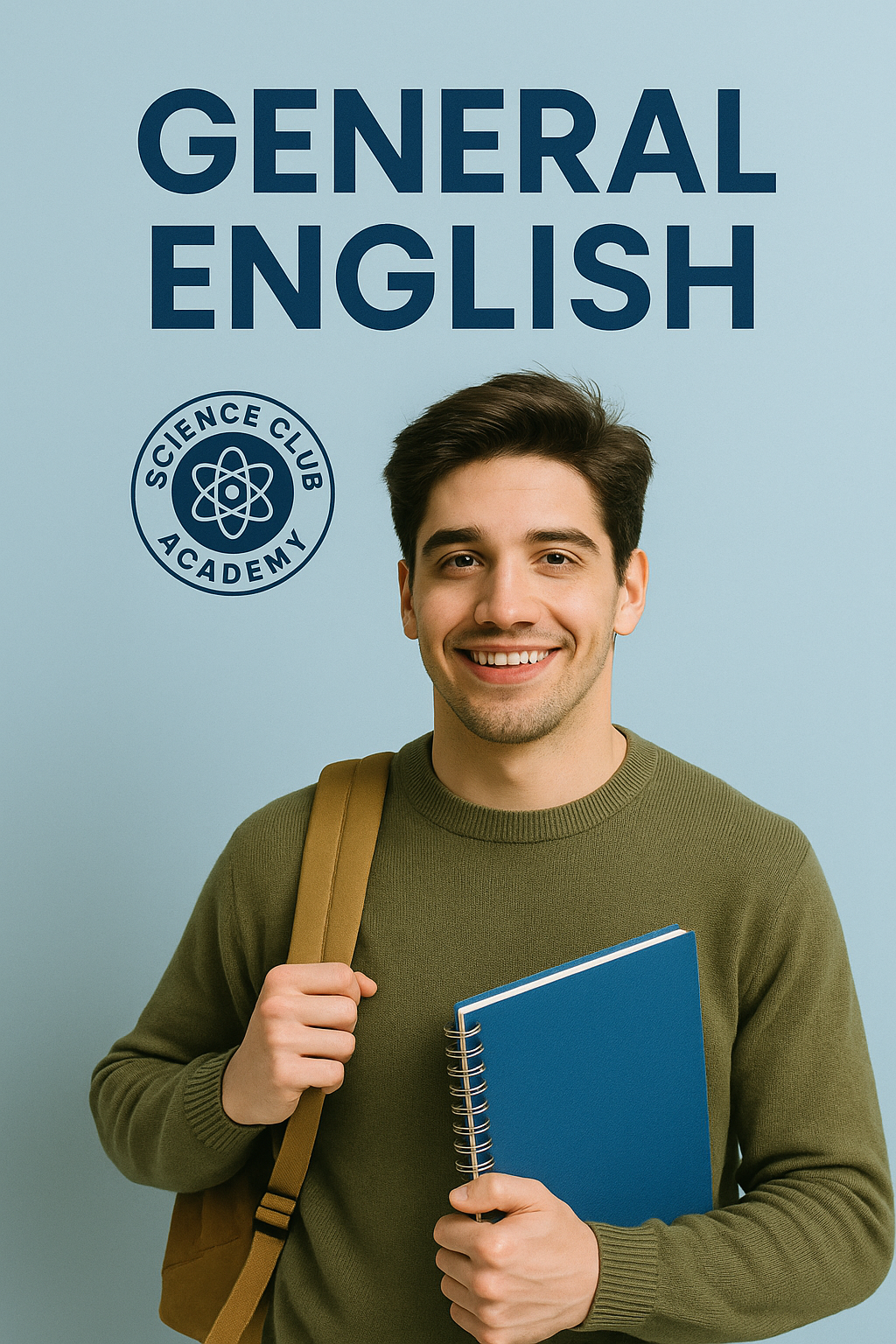
General English Course
🎯 Course Objectives:
The General English course aims to enable students to:
Communicate effectively in English in daily life and academic settings.
Develop the four skills: listening, speaking, reading, and writing.
Build a strong language foundation that will prepare them to pass international tests such as IELTS and TOEFL in the future.
Use language in scientific contexts within various academic activities.
🧩 Number of Levels: 6 progressive learning levels
🟢 1. Level One: Beginner (A1)
Basic vocabulary and everyday greetings.
Introducing oneself and expressing simple things.
Grammar such as the verb "to be" and the simple present tense.
Activity: Classroom conversations - Getting to know each other game.
🔵 2. Level Two: Elementary (A2)
Describing daily routines, places, and people.
Using simple and future tenses.
Writing short sentences and paragraphs.
Activity: Writing a simple diary entry – A dialogue between two friends.
🟡 3. Level Three: Pre-Intermediate (B1)
Social interaction, travel, and shopping skills.
Expanding vocabulary related to everyday life.
Grammar such as the simple past, past continuous, and the first conditional.
Activity: Conversation about a simple scientific experiment – Describing an experiment.
🟠 4. Level Four: Intermediate (B2)
Speak and write about social and cultural topics.
Understand and comprehend intermediate-level articles and conversations.
Give presentations and discuss opinions.
Activity: A short presentation – A report on a scientific experiment.
🔴 5. Level Five: Upper Intermediate (C1)
Dealing with academic texts and complex articles.
Mastering academic writing and formal correspondence.
Discussions and debates.
Activity: Writing a short research paper – A scientific debate.
⚫ 6. Level Six: Advanced (C2)
Language proficiency in advanced professional and academic settings.
Writing specialized research and presentations.
Preparing for international language tests.
Activity: Language graduation project – presenting a scientific proposal in academic language.
🧪 The role of the Science Club Academy in developing students' skills:
📌 1. Distinctive learning environment:
The academy relies on modern and interactive teaching methods.
Small classes to ensure individual interaction.
📌 2. Linking language to science and technology:
Scientific content is integrated with language through projects and experiments.
Reinforcing scientific vocabulary (Science Vocabulary).
📌 3. Supportive activities outside the classroom:
Organizing language competitions.
Writing and speaking workshops supervised by specialized teachers.
📌 4. Continuous assessment and feedback:
Periodic reports for parents.
Individual improvement plans tailored to each student's needs.
📌 5. Academic and Professional Guidance:
Guiding students toward using the language in future specializations (science, technology, entrepreneurship).
🏅 Certificates and Outcomes:
A language portfolio is prepared to track progress.
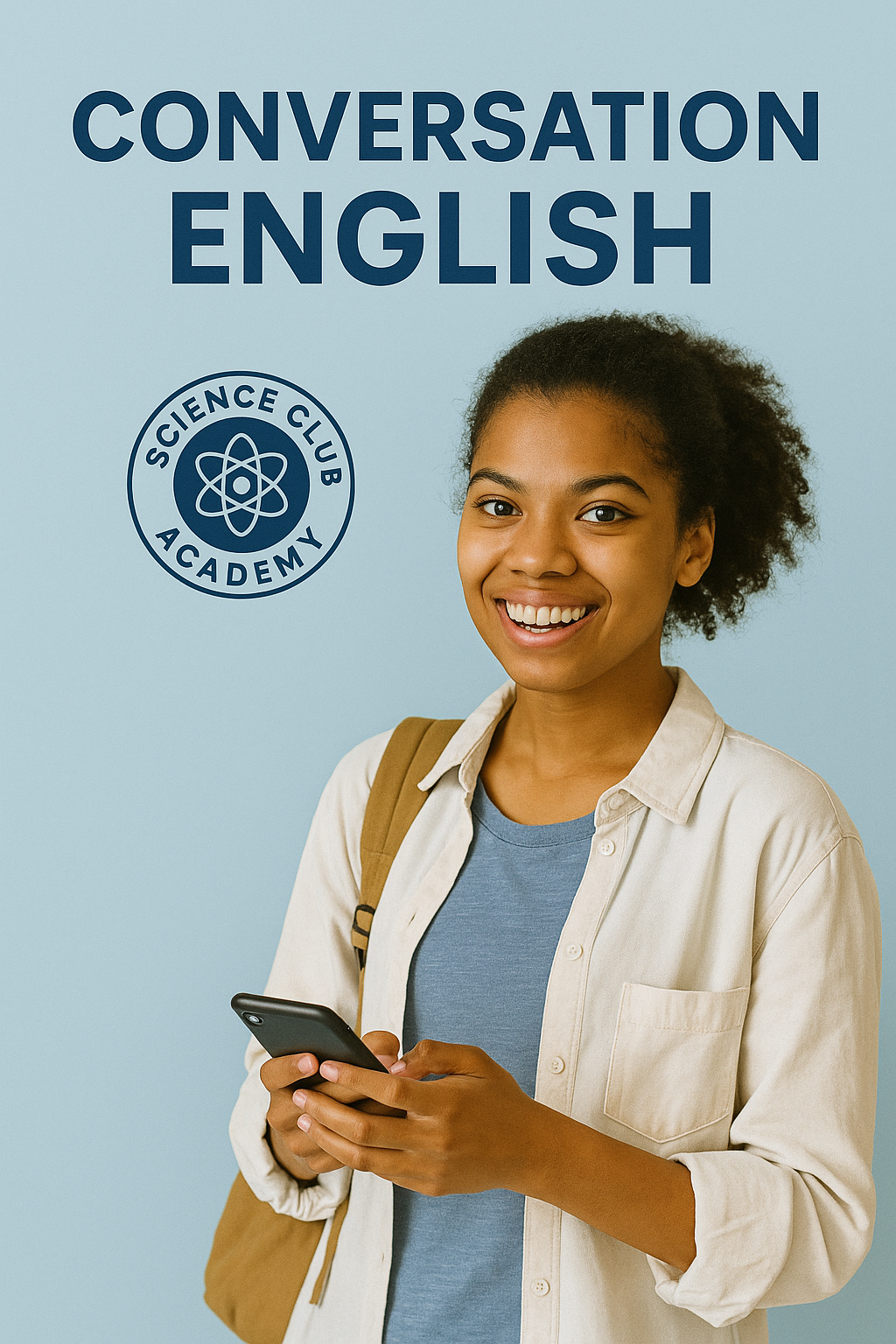
Conversation course
🎯 Course Objectives:
Develop the ability to speak fluently in various life situations.
Enhance listening and pronunciation skills.
Build confidence in speaking in front of others.
Use everyday and professional vocabulary and structures with ease.
Give students the ability to discuss and interact on academic and scientific topics.
📚 Number of Levels: 4 progressive levels
🟢 1. Level One: (Basic Speaking – A1/A2)
Basic sentences and self-introduction.
Speaking about daily activities and hobbies.
Practice correct pronunciation of letters and words.
Activity: Role-play – Conversation about "My Day at School."
🔵 2. Level Two: (Everyday Conversation – B1)
Speaking skills in general situations: shopping, traveling, restaurants.
Identify cultural differences in speaking.
Use idioms and everyday terms.
Activity: Preparing a dialogue between traveling friends – a conversation in a hotel.
🟡 3. Level Three: (Discussion & Debate – B2/C1)
Discuss various topics: technology, the environment, education.
Learn to present a point of view supported by examples.
Practice dialogue and discussion management.
Activity: Classroom debate – "Is artificial intelligence a threat to human jobs?"
🔴 4. Level Four: (Fluent Speaking – Advanced C1/C2)
Master speaking in an academic and professional style.
Use language in presentations, interviews, and public relations.
Improve presentation and persuasive communication skills.
Activity: Complete presentation – "A scientific project in professional English."
🧪 The role of the Science Club Academy in developing students' skills:
📌 1. English-speaking environment:
Use of English in the classroom at a rate of more than 80%.
Supervised by professional trainers
📌 2. Connecting conversation to the scientific and technical field:
Practicing conversation on STEM topics (science, technology, engineering, mathematics).
Creating science conversation clubs (Science Talks).
📌 3. Fun interactive activities:
Weekly discussion groups.
Presentations and role-playing.
Pronunciation and comprehension competitions.
📌 4. Specialized training workshops:
"Speaking with Confidence" workshops.
Academic job interview simulations.
Using techniques such as "TED-style Talks."
📌 5. Ongoing individual assessment:
Customized reports for each student.
Monitoring the development of pronunciation, speed, and confidence in conversation.
🏅 Course outcomes and outcomes:
Acquire the ability to express ideas clearly and professionally.
Develop oral communication skills in academic and professional contexts.
Academy-accredited certificate upon completion of the level. Preparing students to participate in international events and scientific forums.
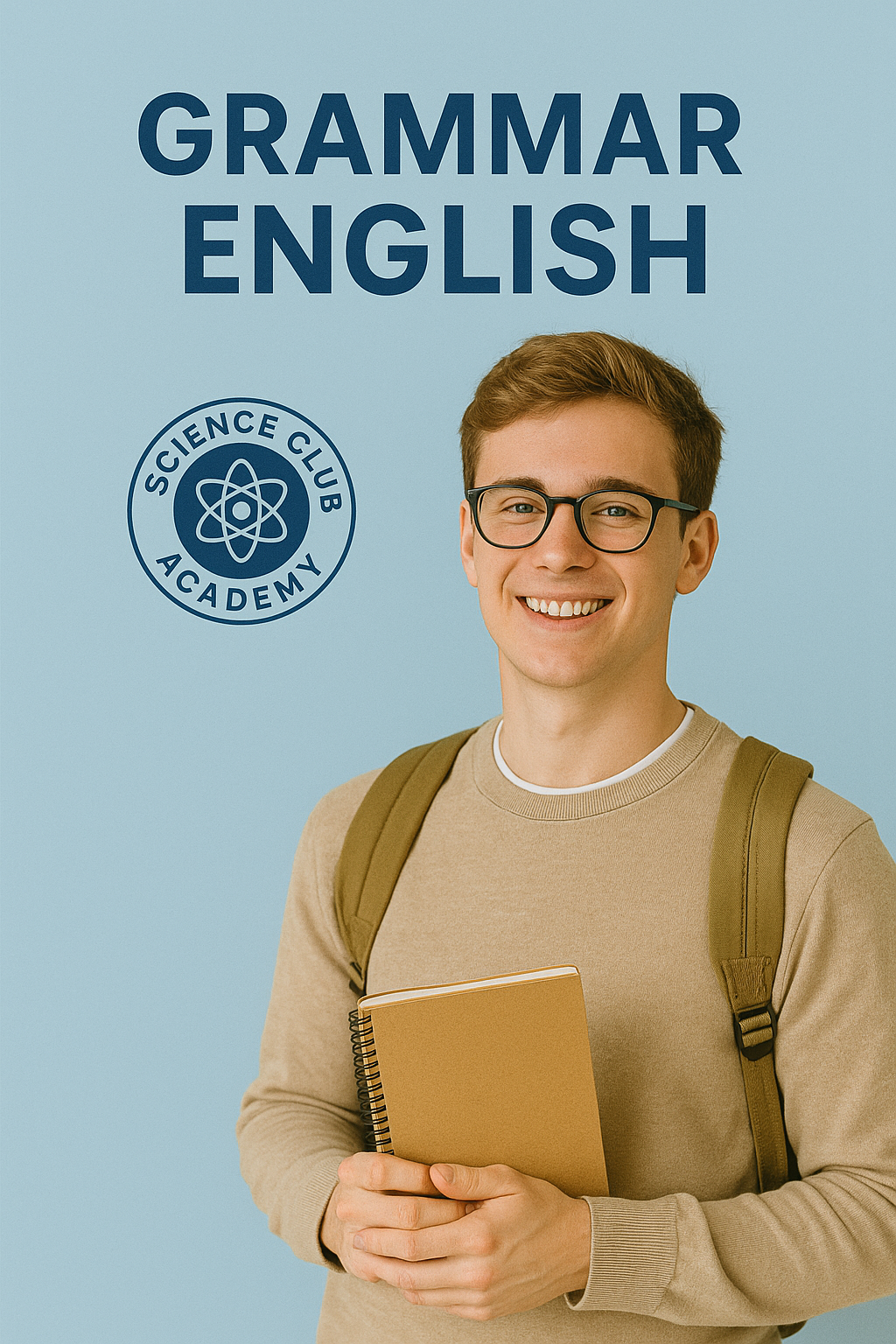
Grammar course
🎯 Course Objectives:
Build a strong foundation in English grammar.
Improve academic writing and correct communication.
Enhance language comprehension through analyzing grammatical structure.
Help students avoid common mistakes in speaking and writing.
Improve performance on academic and language tests such as TOEFL and IELTS.
🧩 Number of Levels: 4 comprehensive and interconnected levels
🟢 1. Level One: (Foundations of Grammar – A1/A2)
Content:
Basic sentence structure (Subject – Verb – Object).
Basic tenses: Simple present and simple past.
Definite and indefinite articles (a/an/the).
Auxiliary verbs (do/does/did).
Simple sentence exercises and error correction.
Activities:
Forming sentences from jumbled words.
Educational games for tense rules.
🔵 2. Level Two: (Grammar in Use – B1)
Content:
Compound tenses: Present Continuous, Past Continuous, Present Perfect.
Adjectives & Adverbs.
Pronouns and their forms.
Comparatives & Superlatives.
Conjunctions and their uses.
Activities:
Write short paragraphs using grammar.
Multiple-choice and self-correction exercises.
🟡 3. Level Three: (Advanced Grammar – B2)
Content:
Passive Voice.
Conditionals.
Advanced conjunctions (Although, however, therefore…).
Future Tense and its types.
Phrasal verbs.
Activities:
Analysis of texts from scientific journals.
Discussions using specific grammar.
🔴 4. Level Four: (Academic & Professional Grammar – C1/C2)
Content:
Advanced academic writing rules.
Using complex conjunctions.
Complex sentence construction.
Perfect tenses.
Controlling writing style and sentence structure.
Activities:
Writing academic essays.
Peer-to-peer assessment and grammatical analysis of scientific texts.
🧪 The role of the Science Club Academy in raising students' levels:
🌟 1. Linking grammar to scientific application:
Grammar exercises within scientific contexts, such as describing an experiment or analyzing a result.
🌍 2. An interactive teaching method:
Integrating grammar with actual conversation and writing.
Using interactive programs to analyze and automatically correct sentences.
🧠 3. Intensive training and continuous assessment:
Short tests at the end of each unit.
Individual progress reports for each student.
🎓 4. Academic guidance for international language tests:
Preparing students for international tests such as TOEFL/IELTS.
Practices on rewriting sentences and improving grammar.
🧑🏫 5. Additional support from teachers:
Individual reinforcement sessions.
Weekly review of the most common mistakes and correct them in a practical manner.
🏅 Course outcomes and outcomes:
Students are able to write grammatically correctly.
Strengthen oral performance by constructing correct and clear sentences.
Higher ability to analyze grammatical texts.
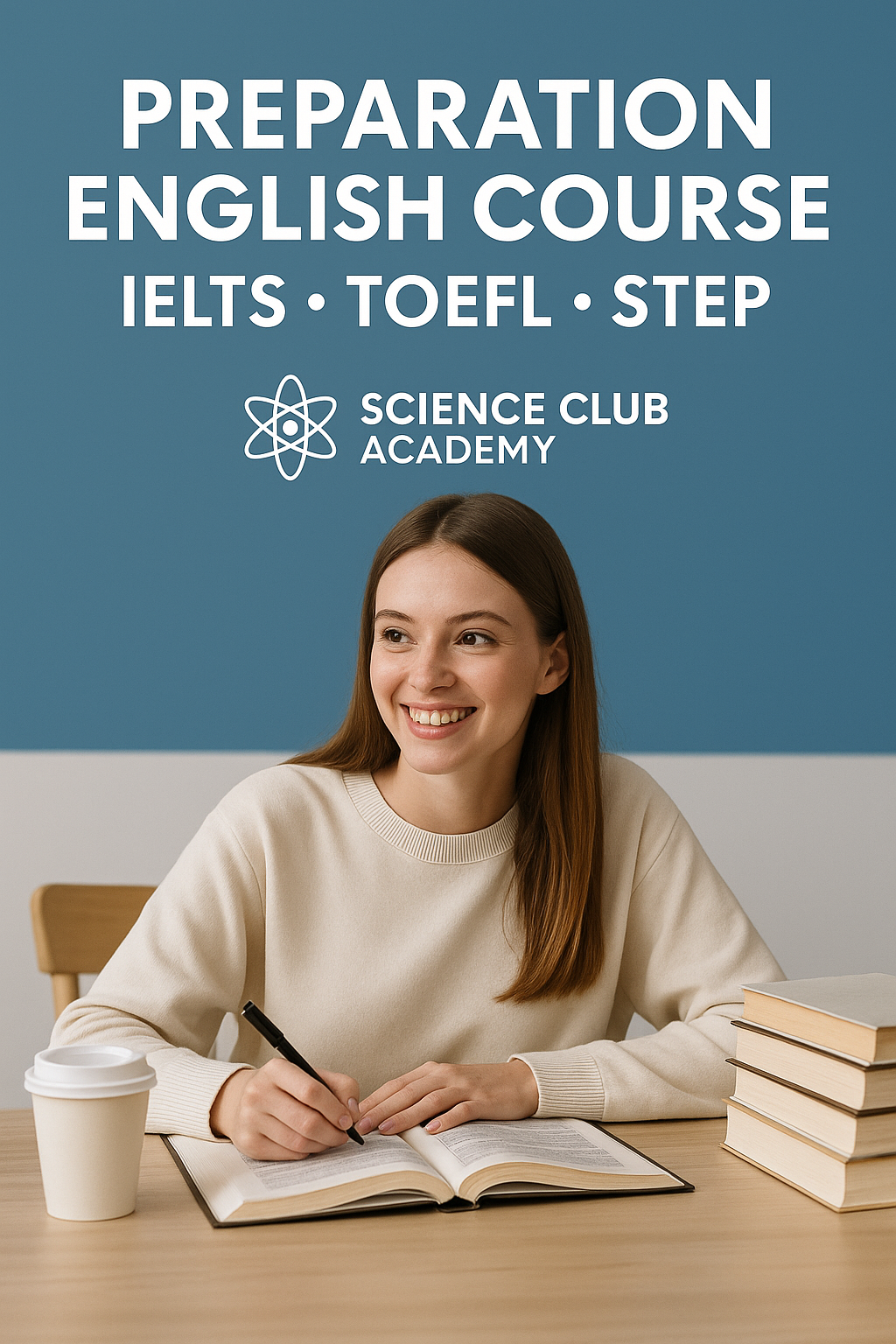
Language test preparation course (IELTS - TOEFL - STEP)
🎯 Course Objectives:
Comprehensively prepare students for all sections of international tests.
Develop the four skills: listening, reading, writing, and speaking.
Practice strategies for solving questions under time pressure.
A realistic simulation of international tests, both academic and general.
Build confidence and overcome test anxiety.
🧩 Number of Levels: 3 Main Levels
🟢 1. Level One: Foundation Level
Suitable for beginners or those with no prior experience with tests.
Focus on:
Reviewing the basics of the language (grammar, vocabulary, sentence structure).
Getting acquainted with the structure of each test: sections, question types, and the time required for each section.
Introduction to general reading and listening skills.
Pronunciation correction and simple audio exercises.
Activities:
Short and simplified models.
Basic vocabulary exercises specific to the test.
🔵 2. Level Two: Skill-Building Level
Suitable for those with prior knowledge who want to develop their skills.
Focus on:
Developing reading and comprehension skills.
Advanced listening techniques and information prediction.
Writing essays of various types (opinion, analytical, comparative).
Constructing solid answers for the speaking section.
Solving multiple-choice questions, fill-in-the-blanks, and academic models.
Activities:
Realistic exercises from previous exams.
Timed practice for each skill.
🔴 3. Level Three: Exam Simulation & Strategy Level
Suitable for those approaching the exam and wanting intensive practice.
Focus on:
Full simulation of official exams.
Time management techniques for each section.
Detailed analysis of student performance with an individual improvement plan.
A quick review of important grammar and vocabulary.
Individual conversation sessions that simulate the actual oral exam.
Activities:
100% simulated mock tests.
Individual assessment and performance analysis sessions.
🧪 The Role of the Science Club Academy in Raising Student Levels:
🌟 1. Individually Targeted Education:
Each student's level is assessed before the course begins to determine their starting point.
🧑🏫 2. Certified Trainers with International Experience:
Teachers with accredited teaching certificates.
🧠 3. Professional Training Using the Latest Tools:
Use of Interactive Platforms for Test Simulation.
Performance Analysis Using Artificial Intelligence Systems.
🎓 4. Psychological and Motivational Support for Students:
Motivational Sessions to Boost Confidence.
Exercises on Overcoming the Fear of Public Speaking.
📊 5. Weekly Progress Reports:
Accurate Statistics on the Development of Each Skill.
A Customized Plan for Each Student to Strengthen Weaknesses.
🏅 Course Outcomes:
Full Preparation for the Academic or General Examinations.
High Test Scores Based on Previous Student Performance

Business English Course
🎯 Course Objectives:
To enable the learner to use English in the workplace and professional activities.
To develop professional communication skills (email writing, phone calls, meetings, presentations).
To expand vocabulary for management, marketing, human resources, finance, international trade, and other fields.
To refine English for negotiations, report preparation, and professional conversations.
🧩 Number of Levels: 3 Main Levels
🟢 1. Level One: Elementary Business English
Suitable for beginners, university students, and recent graduates.
Content:
Basic vocabulary for the workplace.
Introducing yourself and the company.
Writing simple emails.
Making short phone calls.
Introduction to CV writing and interviews.
Activities:
Professional phone call simulations.
Exercises for writing short letters and formal applications.
🔵 2. Level Two: Intermediate Business English
Suitable for new employees or job applicants.
Content:
Writing business reports and official memos.
Meeting and discussion skills in English.
Preparing professional presentations.
Business negotiation terminology and time management.
Dealing with customers and complaints.
Activities:
Job interview simulations.
Writing marketing and analytical reports.
Group discussions in class.
3. Level Three: Advanced Business Communication
Suitable for department managers or experienced professionals seeking excellence.
Content:
Speak fluently in multinational professional environments.
Preparing and delivering detailed presentations using advanced language.
Persuasion and influence skills in meetings and negotiations.
Specialized writing (performance reports, business plans, financing proposals).
Analyzing business language in official mail, contracts, and offers.
Activities:
Real-life case studies.
Actual presentations and performance evaluations.
Business negotiation simulations.
🧪 The Role of the Science Club Academy in Raising Student Levels:
🌟 1. A Realistic Learning Environment:
Interactive training that simulates real-life situations.
Role-play simulations for interviews, meetings, and negotiations.
🧑🏫 2. Specialized Trainers:
Teachers with experience in business and vocational training.
📈 3. Modern, Internationally Accredited Curricula:
Adopting Oxford, Cambridge, and Pearson curricula for business English.
🧰 4. Technological Training Tools:
Using project management tools and professional email such as MS Outlook and Slack during training.
🎓 5. Ongoing Personal Support:
Individual Assessment Sessions.
Guidance on the Use of English in Daily Professional Life.
🏅 Course Outcomes:
Proficiency in using English in the workplace.
Self-confidence in presentations, meetings, and communicating with clients.
Improve your chances of getting accepted into international and local jobs.

Academic Language Course
🎯 Course Objectives:
Prepare students to use English in an academic university context.
Develop academic reading, formal writing, listening, and formal speaking skills.
Understand and use academic terminology and linguistic structures appropriate for study and research.
Enabling students to prepare research papers, presentations, and university reports in English.
🧩 Number of Levels: 4 progressive levels
🟢 1. Level One: Foundation Academic English
Introductory Level - Suitable for high school or early university students
Content:
Basics of academic reading.
General Academic Vocabulary (AWL).
Writing simple paragraphs and introductions.
Speaking about general academic topics.
🔵 2. Level Two: Pre-Intermediate Academic English
Suitable for undergraduate students
Content:
Reading and analyzing academic articles.
Writing short essays.
Listening to and summarizing simplified lectures.
Practice simple research skills.
🟠 3. Level Three: Intermediate Academic English
Suitable for university students and researchers in the research phase.
Content:
Reading academic research and articles.
Writing in a professional academic style (articles, reports, presentations).
Practicing citation and quotation skills (APA - MLA).
Presenting ideas in academic discussions.
🔴 4. Level Four: Advanced Academic English
Suitable for graduate studies and preparing for academic publication.
Content:
Writing professional research papers.
Analyzing previous studies and references.
Participating in advanced academic discussions.
Preparing for international academic conferences and presentations.
🧪 The role of the Science Club Academy in raising the level of students:
🌟 1. Providing an interactive research-based learning environment:
Practical application of academic skills in projects and classroom discussions.
2. Specialized Academic Supervision:
Trainers with advanced academic degrees and experience in research preparation.
3. Full Support for Academic Research Skills:
Assistance in selecting research topics, compiling references, and writing content.
4. Use of International References:
Relying on books and sources from Cambridge Academic English and Oxford Academic Skills.
5. Comprehensive and Progressive Assessment:
Regular tests to measure the student's skills in each academic skill.
4. Course Outcomes and Results:
The ability to study academically in English proficiently.
Preparation for admission to international graduate programs.
Proficiency in writing research papers and university projects professionally.
Improvement in IELTS Academic test results and academic reports.
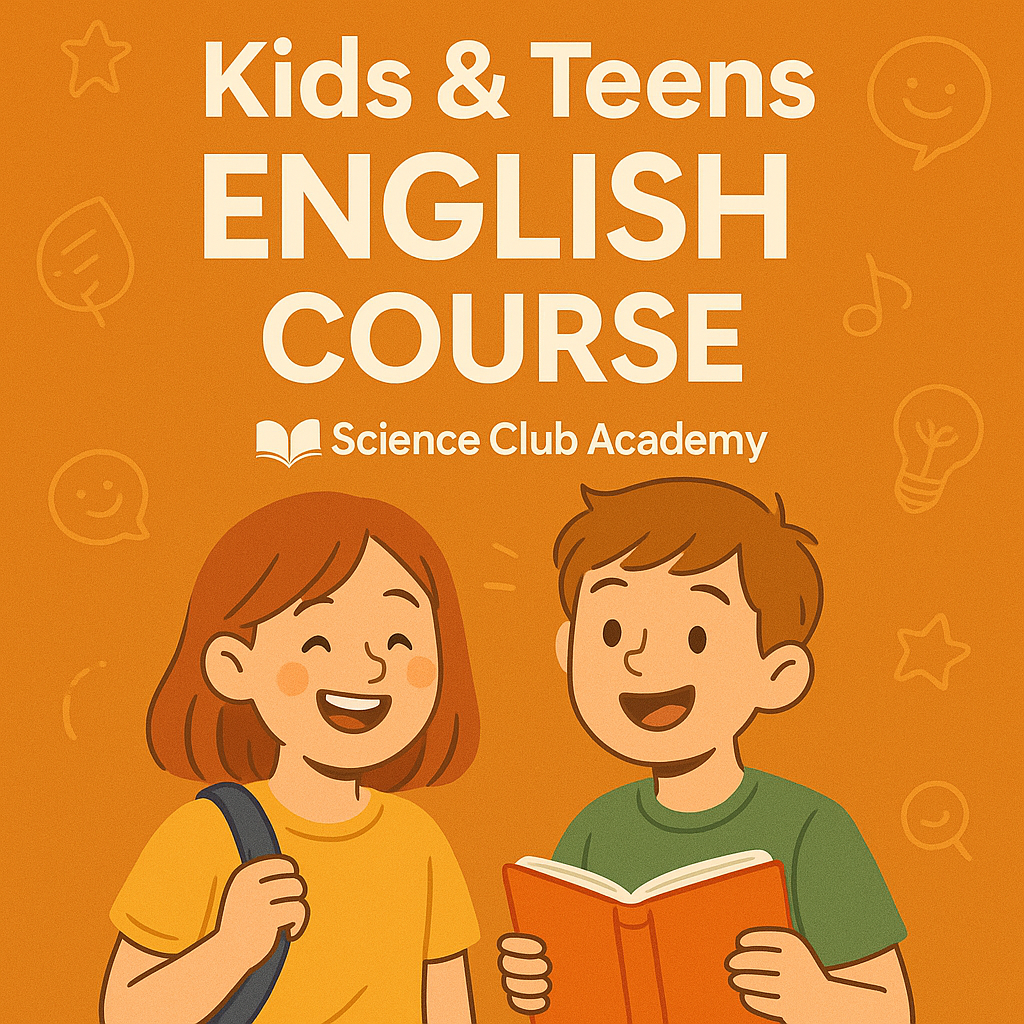
Language courses for children and adolescents
🎯 Course Objectives:
Develop basic language skills (listening, speaking, reading, and writing).
Teach English in a simple and fun way that is age-appropriate.
Enhance self-confidence when speaking English.
Stimulate a love of learning and exploration through language.
🧩 Number of Levels: 6 progressive levels (divided by age and language level)
🟢 1. Starter Level – Foundation (for ages 4-6)
Teaching letters and sounds (phonics).
Daily vocabulary (colors, numbers, family).
Interactive songs and picture stories.
Interactive hands-on activities that connect language to life.
🔵 2. Basic Level 1 (ages 6-8)
Formation of simple sentences.
Vocabulary about school, food, and animals.
Educational games and mini-workshops.
Introduction to short everyday conversations.
🟠 3. Basic Level 2 (Ages 8-10)
Strengthen reading and comprehension skills.
Write short sentences and paragraphs.
Group conversation activities.
Watch and discuss short educational videos.
🟡 4. Pre-Intermediate (10-12 years)
Learn basic grammar.
Write paragraphs – creative writing skills.
Dialogues and role-plays to develop pronunciation and confidence.
Prepares for extended listening and close reading skills.
🔴 5. Intermediate (12-14 years)
Advanced grammar skills and simplified academic vocabulary.
Write letters and short essays.
Practice small presentations.
Gradual preparation for tests such as Cambridge Starters/Movers/Flyers.
🟣 6. Junior Advanced (14-15 years)
Prepares for transition to academic courses or TOEFL/IELTS courses.
Dealing with longer texts and assignments.
Text analysis and opinion-making skills.
Preparing for student interviews and debates.
🧪 The role of the Science Club Academy in raising the level of children and adolescents:
🌈 1. A fun and safe learning environment:
Using games, stories, and interactive theater.
👩🏫 2. A teaching team specializing in teaching children:
Teachers trained in educational interaction with young children.
Using modern methods such as learning through play and stories.
🎨 3. Various enrichment activities:
Drawing workshops, theater, simple science experiments in English.
Word and pronunciation competitions (Spelling Bee – Storytelling Day).
🏆 4. Periodic evaluation and feedback for parents:
Periodic reports on the child's progress.
Supportive home activities.
Educational courses for parents on learning support.
🏅 Course Outcomes and Results:
The child speaks English confidently and with correct pronunciation.
Develops the ability to express and write in English.
Readiness for admission to international schools or the Cambridge Exam for Children.
A lasting love of the English language as a means of learning and expression.
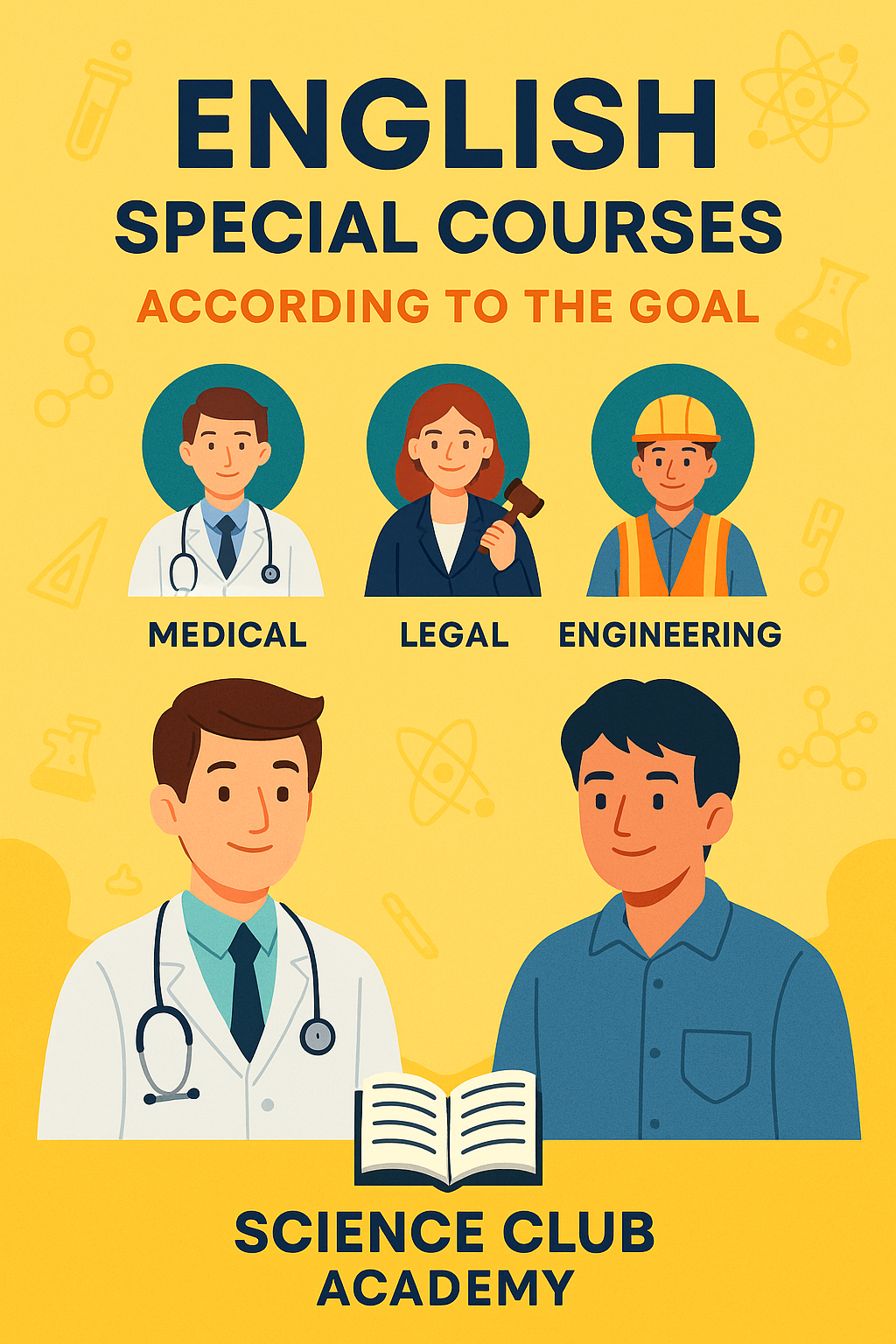
Special courses according to the goal (medical conversation - legal - engineering...)
🎯 Course Objectives:
To enable students to use English fluently in their professional settings.
To enhance communication skills and understanding of specialized terminology and situations.
To practice real-life situations (role play, case studies, simulations).
To develop the four skills (listening, speaking, reading, and writing) according to the student's specialization.
🧩 Number of Levels: 3 main levels for each specialization
🟢 1. Foundation Level
Introduction to specialized terminology.
Everyday and basic sentences in a professional context.
Simple conversations and general situations in the specialization.
🟠 2. Intermediate Level
Using language in real-life situations.
Specialized reading and writing skills (reports, case descriptions, minutes).
Group discussions and assignments that reflect the work environment.
🔴 3. Advanced Level
Specialized discussions - case studies.
Presenting ideas or projects in English.
Presentation and meeting skills training.
🧪 Course specializations:
🩺 1. English for Medical Purposes – Medical English
Medical terminology and diagnosis.
Writing medical reports.
Doctor-patient conversations.
Prescribing medications and handling emergencies.
⚖️ 2. English for Legal Purposes – Legal English
Legal terminology and contracts.
Writing legal minutes.
Lawyer-client conversations.
Legal reading and comprehension exercises.
🛠️ 3. English for Engineering – Technical engineering terminology.
Writing technical reports and official emails.
Understanding technical specifications and maps.
Communication training in engineering teams.
🏢 4. English for Business – Business English
Business correspondence – reports – meetings.
Presentation and negotiation skills.
Preparing CVs and cover letters for jobs.
🧪 5. English for Science & Research – For scientific research
Writing scientific papers.
Conference presentation skills.
Understanding research and academic terminology.
✈️ 6. English for Tourism & Hospitality – Tourism and Hospitality
Communicating with tourists.
Reservations, guidance, and hotel services.
Training for everyday situations in hotels and airports.
🧬 The role of the Science Club Academy in raising the level of students:
🧑🏫 1. Accurate and appropriate scientific content for each specialization
Relying on approved and up-to-date references (such as Oxford ESP – Cambridge).
Developing interactive content suitable for the local and international work environment.
🛠️ 2. Practical environment and simulation situations
Simulating professional meetings.
Role-playing a patient/lawyer/engineer/project manager.
Presenting small projects in English within the specialization.
📈 3. Supporting labor market skills
Preparing students to use English in job interviews.
Developing writing and formal communication skills.
📝 4. Continuous assessment and feedback.
Practical tests after each unit.
Individual reports for each trainee on strengths and development points.
🏅 Course outcomes:
The ability to use English accurately in specialized situations.
Fluency in professional terminology and dialogue.
Preparedness for international dealings and for jobs requiring specialized language.
The ability to attend conferences and write specialized research or reports.